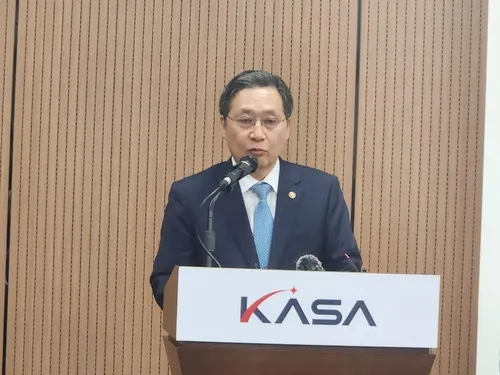Is LG Group Venturing into the Space Industry?

Synopsis
Key Takeaways
- LG Group is considering a venture into the space industry.
- They plan to achieve lunar landing by 2032.
- KASA is promoting private sector involvement in aerospace.
- LG has a history of collaboration with NASA.
- Development of reusable launch vehicles is critical.
Seoul, June 27 (NationPress) The LG Group of South Korea is contemplating a move into the space sector and is actively investigating potential business ventures in this domain, according to the Korea Aerospace Administration (KASA) following discussions held with the conglomerate.
KASA Administrator Yoon Young-bin engaged with LG representatives at the group's research and development (R&D) hub in Seoul to evaluate strategies aimed at enhancing the private sector's involvement in South Korea's aerospace industry.
During the discussions, LG shared insights into its current assessment of space-related technologies and provided updates on its initiatives to support local space startups, as reported by KASA.
The conglomerate highlighted a successful case study involving a lunar rover mobility test conducted in collaboration with the local startup, Unmanned Exploration Laboratory, and revealed a long-term vision to achieve lunar landing by 2032, as per Yonhap news agency.
Previously, LG Energy Solution Ltd., the battery manufacturing arm of the group, was chosen by the U.S. National Aeronautics and Space Administration (NASA) in 2016 to supply lithium-ion batteries for astronaut spacesuits utilized in deep space missions.
“LG is in the preliminary phases of assessing the viability of entering the space industry. We intend to thoroughly analyze various environmental aspects in space and consider potential business models,” stated an official from LG.
KASA emphasized the significance of key governmental policies aimed at broadening private sector involvement in the space industry and the necessity for prompt adaptation to technological and policy changes.
Earlier this month, South Korea's space agency announced plans to develop a reusable space launch vehicle by 2035 to stay competitive in the swiftly evolving global space industry.
The Korea Aerospace Administration (KASA) is working to revise its 2.1 trillion-won (US$1.53 billion) project for a next-gen rocket, initially designed as a single-use launch vehicle, into a reusable system, aiming to acquire the requisite technology in the next decade.
The agency underlined the urgency of advancing reusable launch vehicles, especially in light of the rapid transformations occurring in the global space transportation market, propelled by the success of SpaceX's Falcon 9 and Starship.









